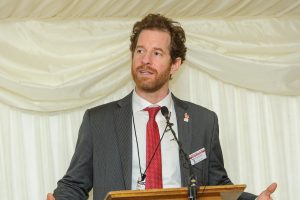
Dr Cox explains; “The sudden collapse of Danish midfielder, Christen Eriksen is another terrible reminder of the horrendous impact cardiac conditions have on so many young people every day in the UK and across the world.
“Every week in the UK, at least 12 apparently fit and healthy young people will collapse and die suddenly from previously undiagnosed heart conditions.
The charity Cardiac Risk in the Young (CRY) was established in 1995 to raise awareness of the, often misunderstood and under-represented, fact that heart conditions can affect all people of all ages (not just older people) and of all athletic abilities – and that much more still needs to be done to prevent cardiac arrests in young people.
“And, whilst specialist cardiac screening will identify most conditions and defects that can cause these devastating cardiac arrests (and therefore prevent most of these sudden and tragic deaths) like all asymptomatic screening, it is not fool proof which is why CRY also funds much needed research at our world-renowned centre based at St George’s, University of London.
Dr Cox adds; “There is no question that proactive cardiac screening saves lives, but it will not save everyone. Christian’s collapse and the amazing medical response shows how important CPR training and the swift use of AEDS (or ‘defibs’) can be. But it’s so important to recognise that the vast majority of young people will collapse whilst at home, alone or during rest and in their sleep. We have to do everything we can to understand why these collapses and sudden cardiac arrests happen and that is why research is so important.
“Over the past 25 years we have learnt so much about cardiac conditions which can affect young people. We know that one in 300 people tested by CRY will be identified with an underlying cardiac condition which, if left untreated, could be life-threatening.
“We know screening identifies most conditions, but we also know these conditions usually (in around 80% of cases) will have no symptoms before collapse. There are still too many unknowns.
“Often the first sign that anything is wrong with a young person’s heart will be the last sign.
“One of the greatest concerns I have is our understanding about the way some people acquire cardiac conditions. We know some people are born with or inherit condition. But others acquire or will develop a condition, maybe after a viral attack or high level, endurance training.
“Sport itself will not actually cause sudden cardiac death but it can significantly increase a young person’s risk if they have an underlying condition. International data recognises that in Italy, where screening is mandatory for all young people engaged in organised sport – including at a grass roots level – they have reduced the incidence of young sudden cardiac death by a staggering 89%.
“It is impossible for most people to comprehend how the family and friends of Christian felt as the medical team were saving his life, but for thousands of families whose children have died from cardiac conditions this will have taken them straight back to the worst moment in their lives. The moment which changed everything for them forever.
“These families never received the wonderful news of their child sitting up in bed having recovered – but this was the news that everyone (particularly teammates and those present in the stadium and on the pitch) who witnessed this horrific collapse were so desperately holding onto yesterday and were so thankful for when the official statements about his ‘stable condition’ were released.
“Yesterday was a terrible reminder that even the young and fittest in our society are at risk.
“I am confident that in time the work of CRY and the 1000s of bereaved families who support our aims will one day achieve our goal of preventing these terrible events from occuring. But for now, it is vital for people to know this can happen, how to try to prevent it happening and what to do if someone collapses.
“Any family who has been affected should know they can contact us, here at CRY. Our charity can provide specialist bereavement support for the family but can also ensure the correct follow up cardiac testing and assessment is carried out as a matter of priority to determine if family members are potentially at risk.”





